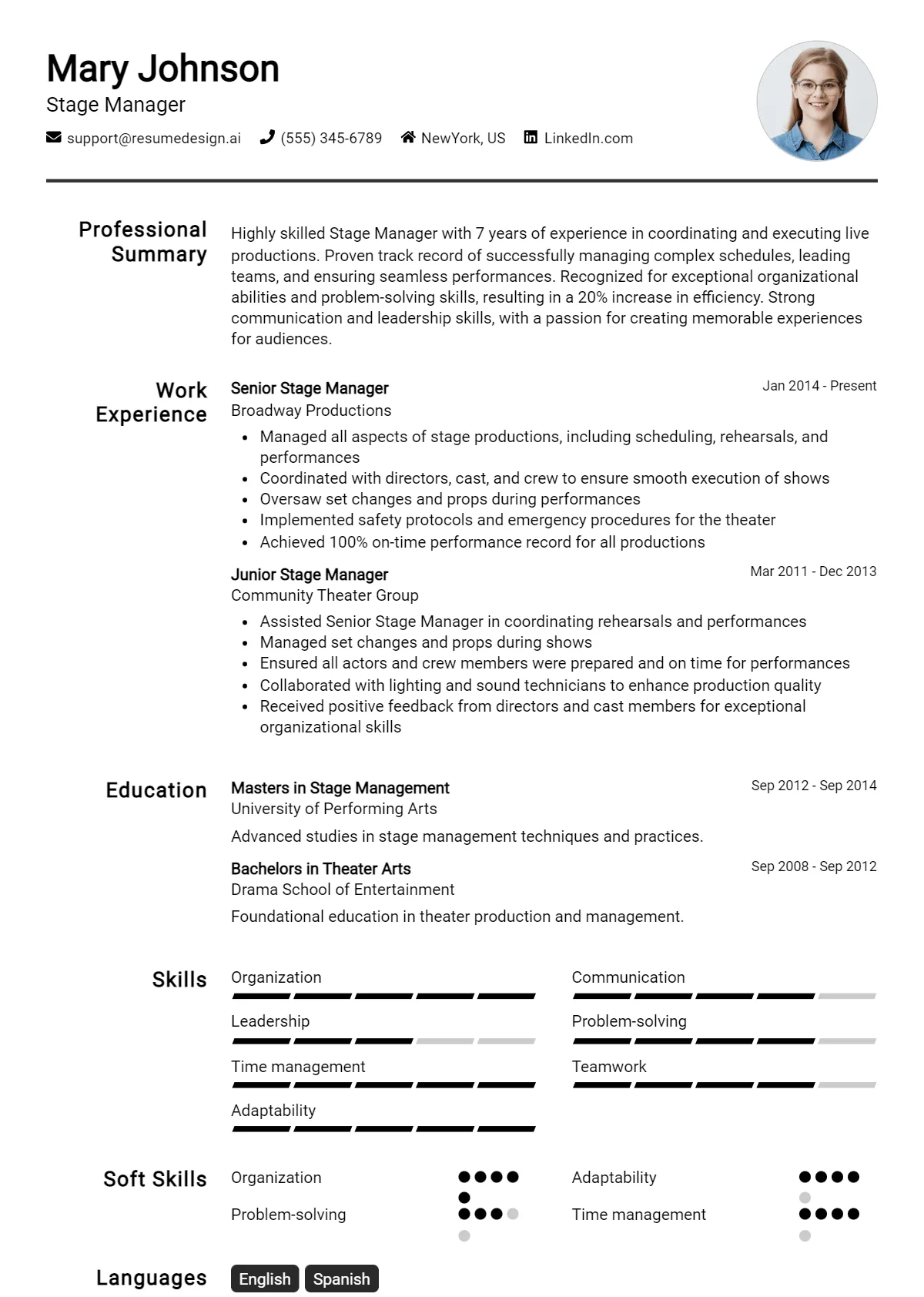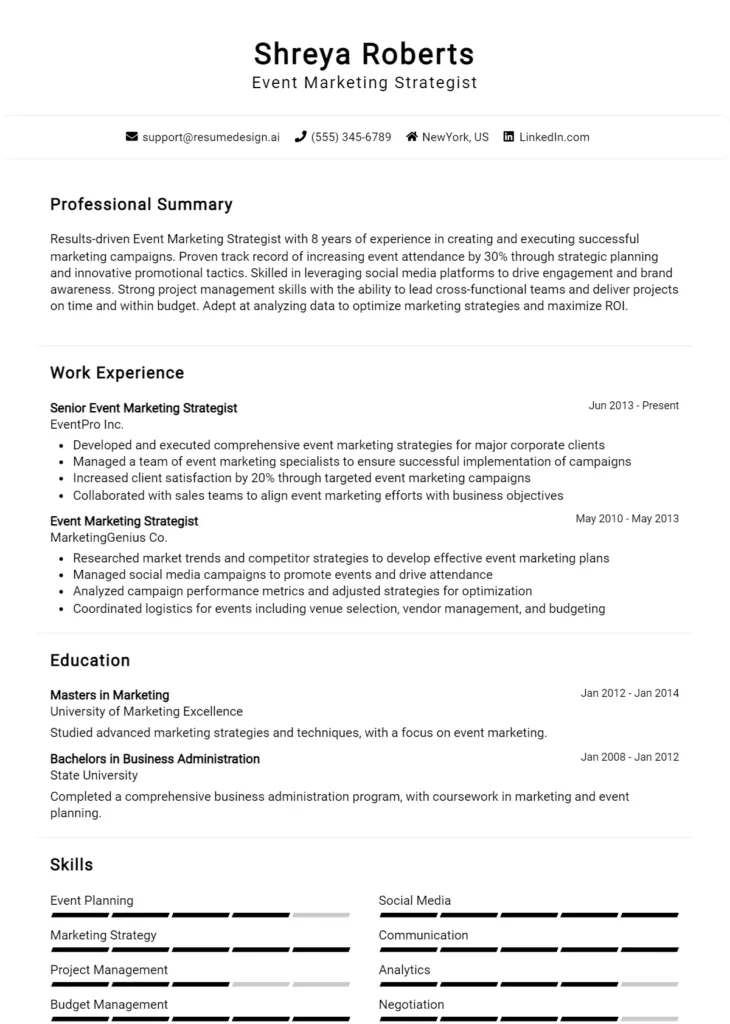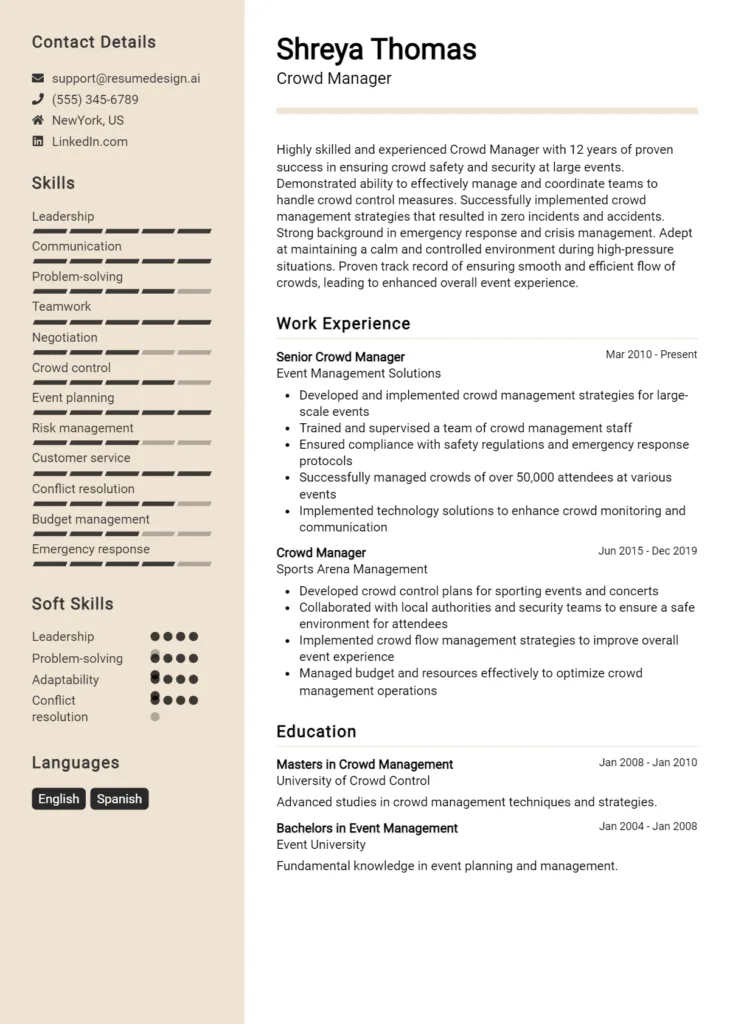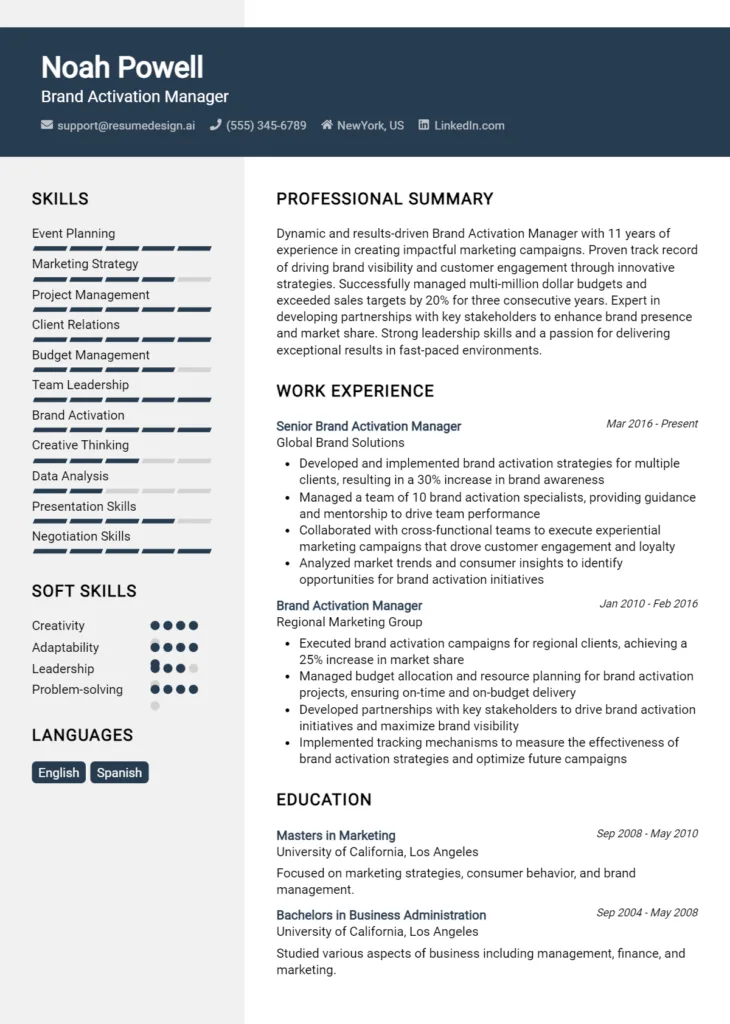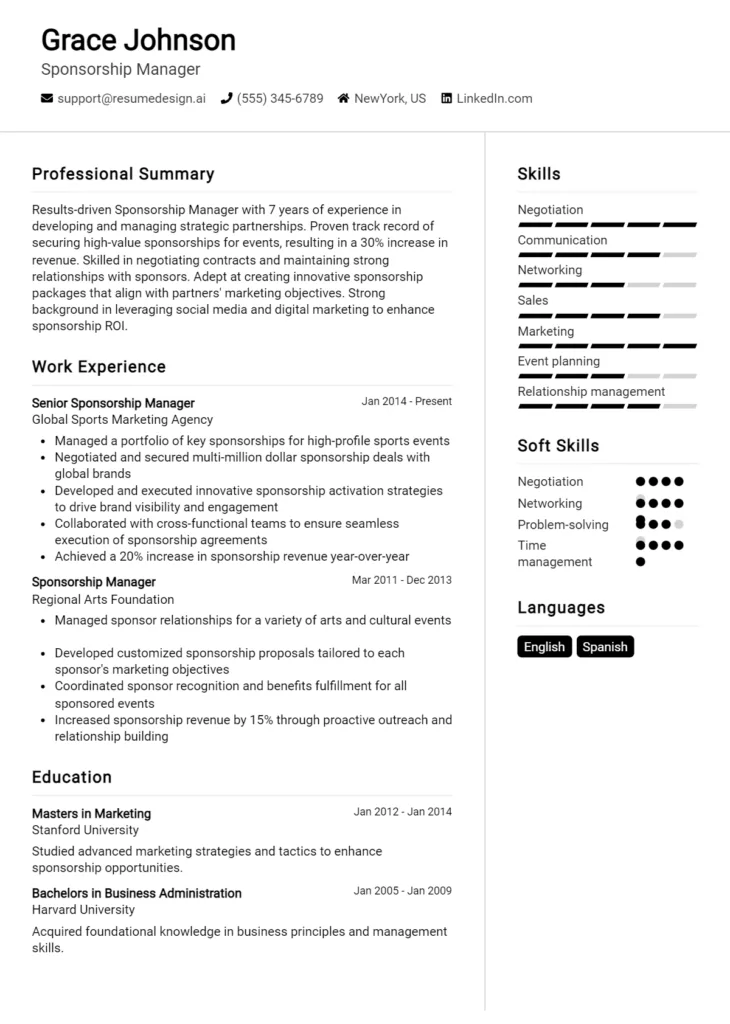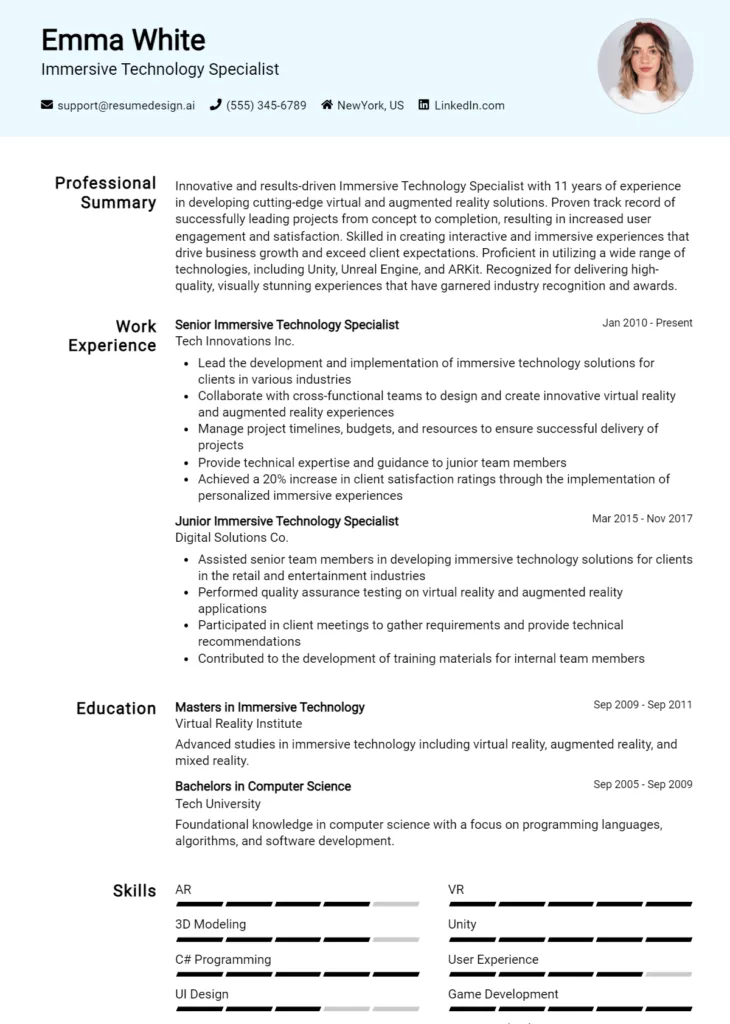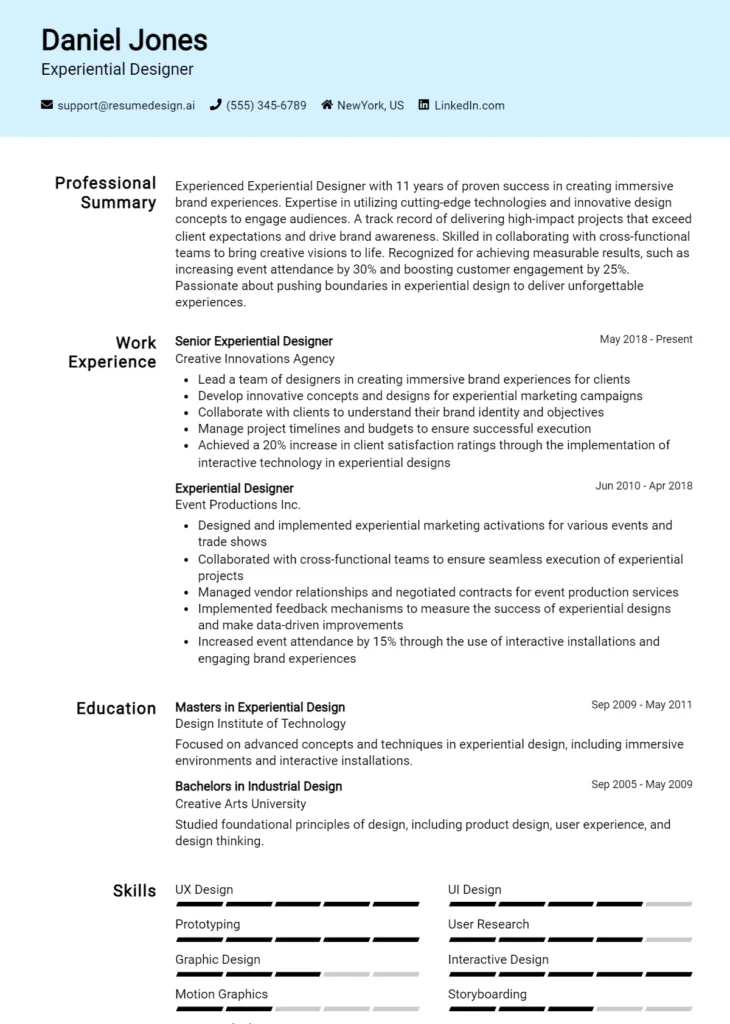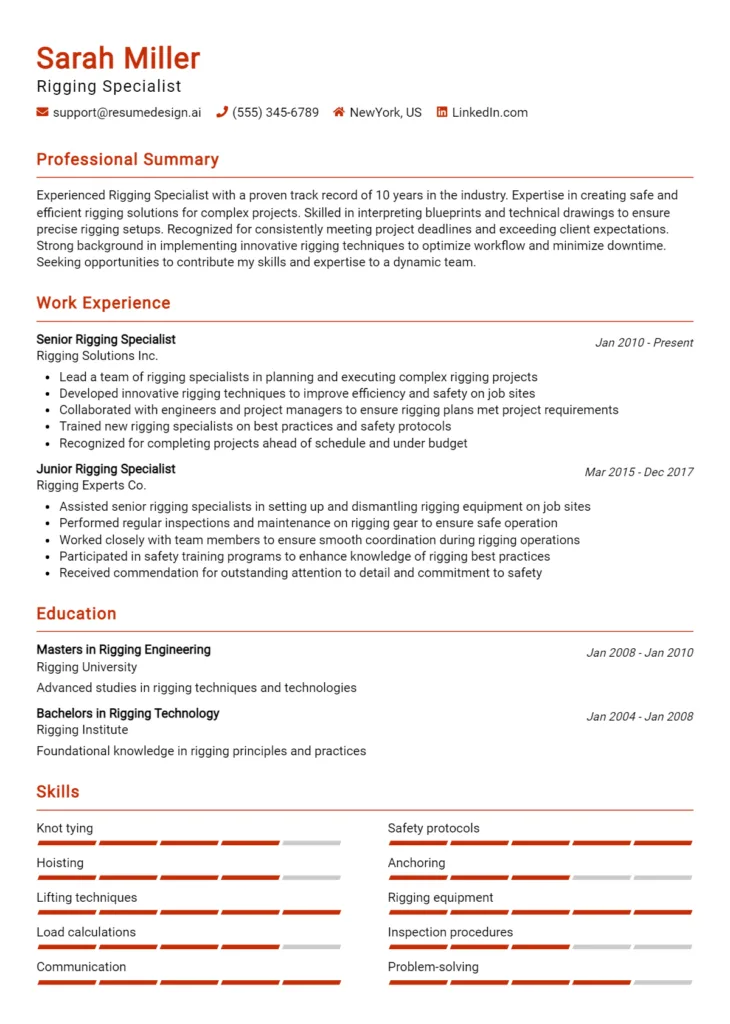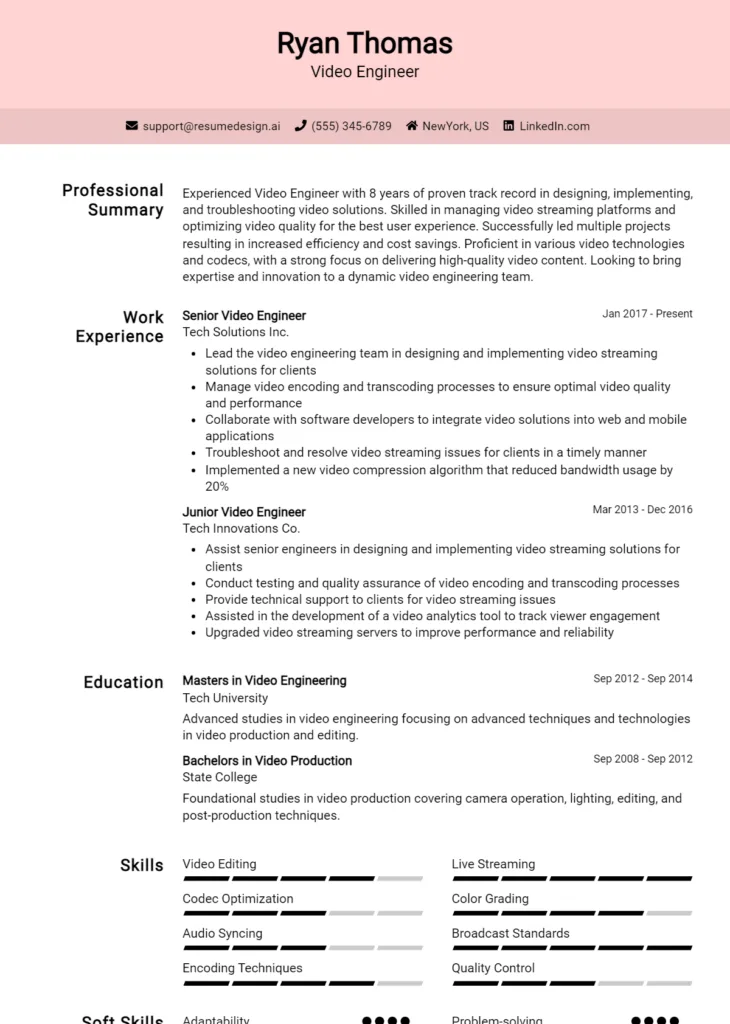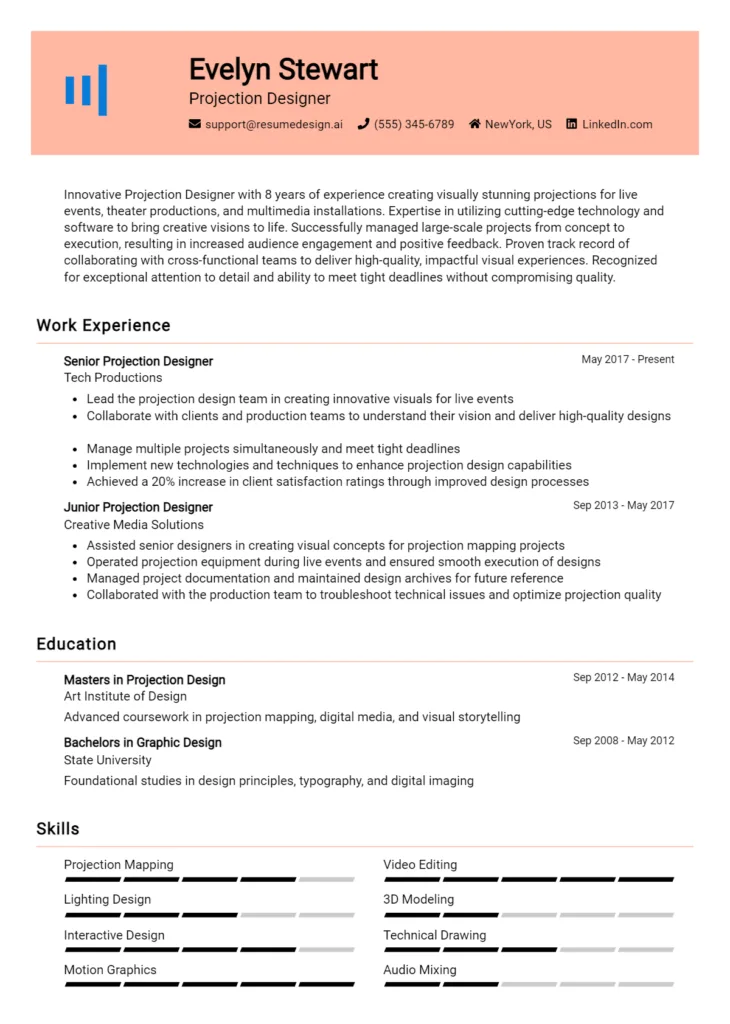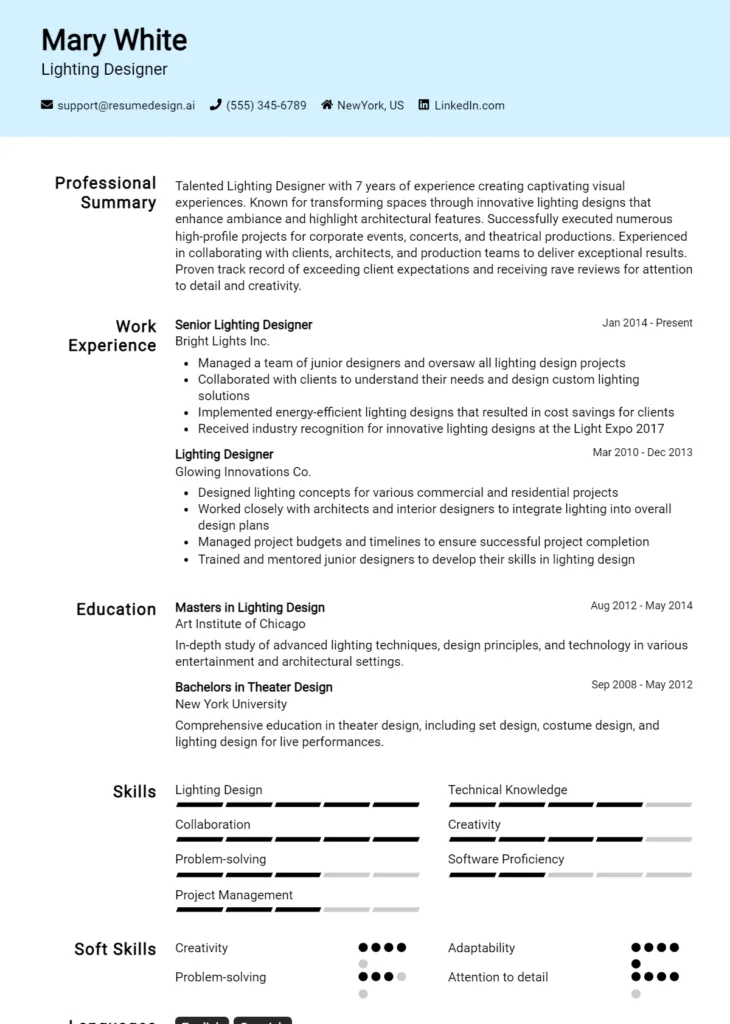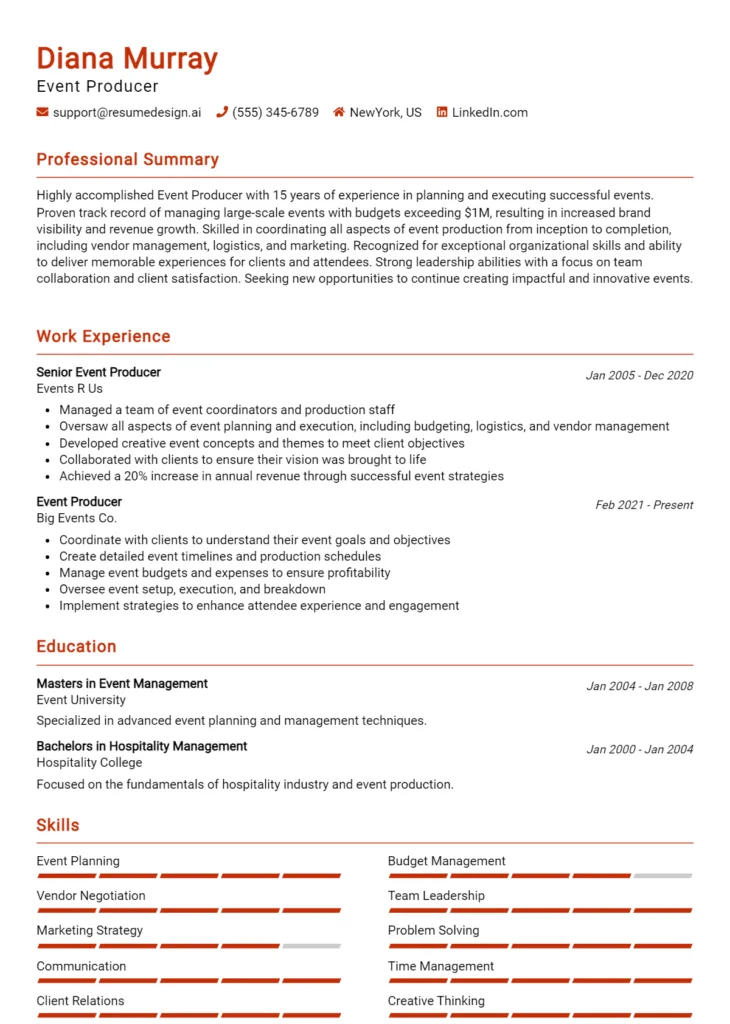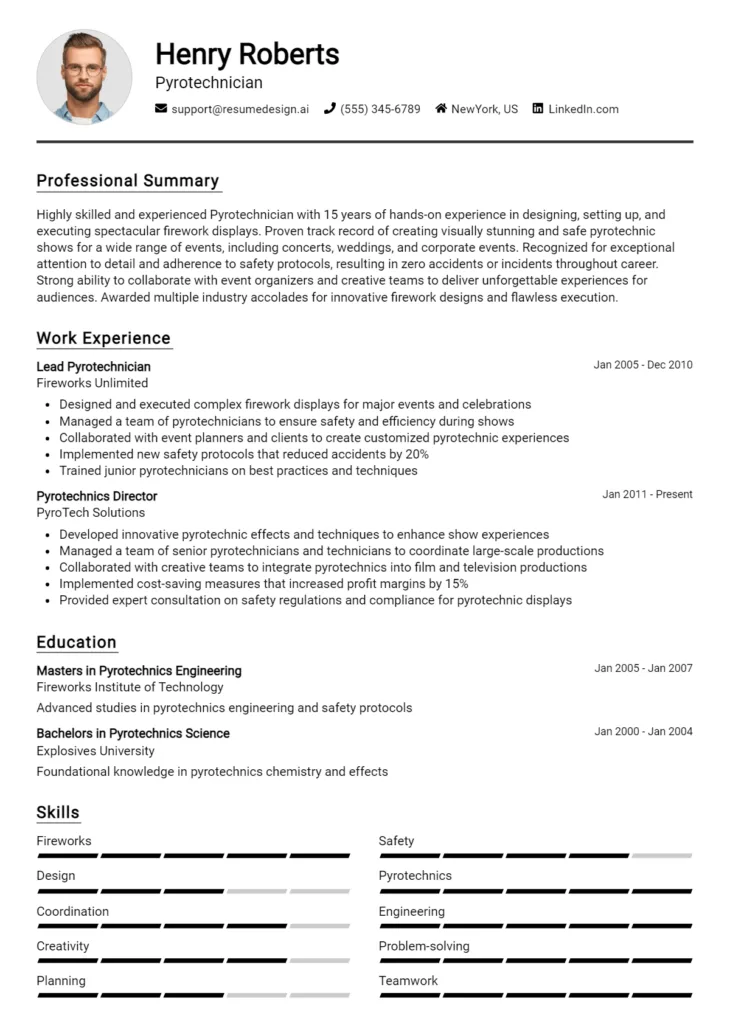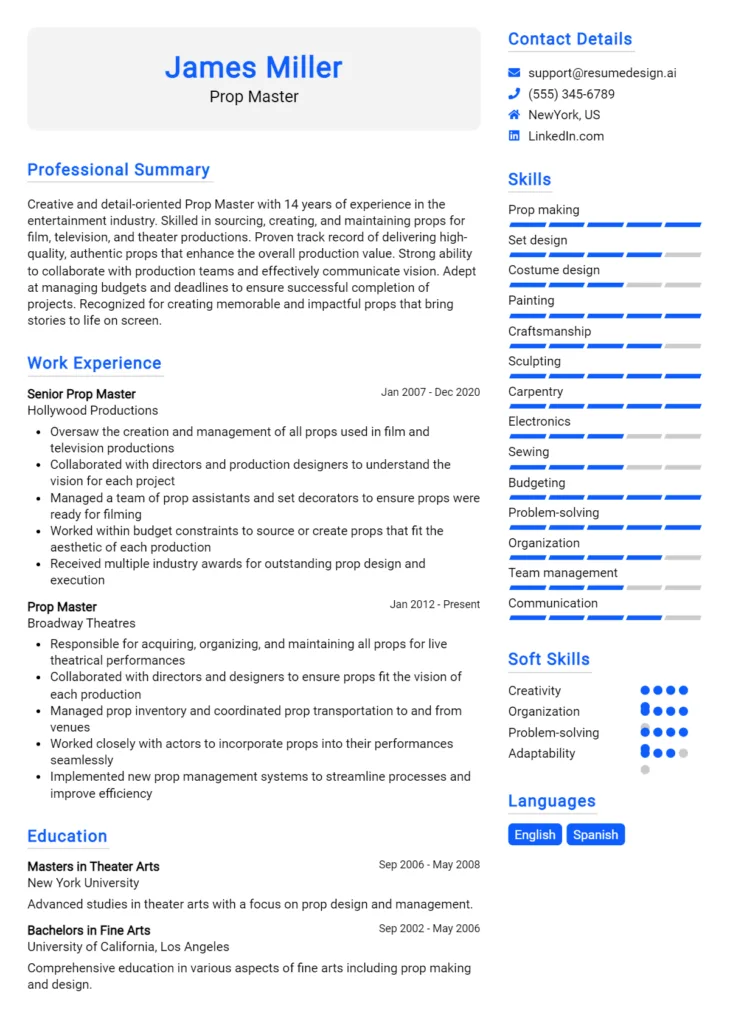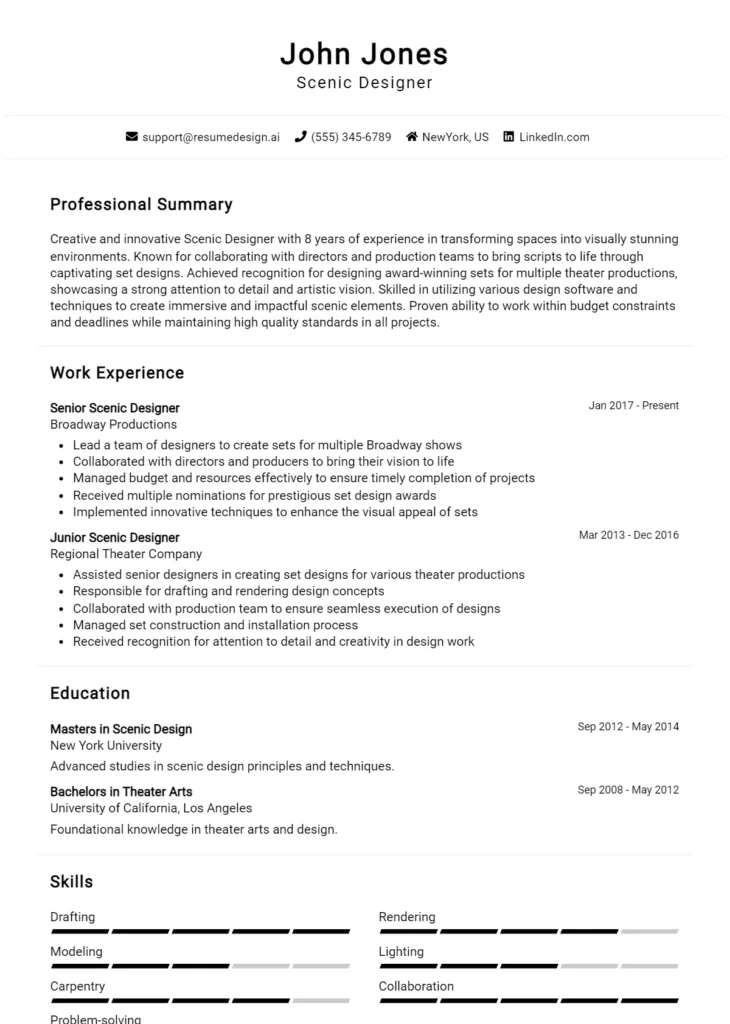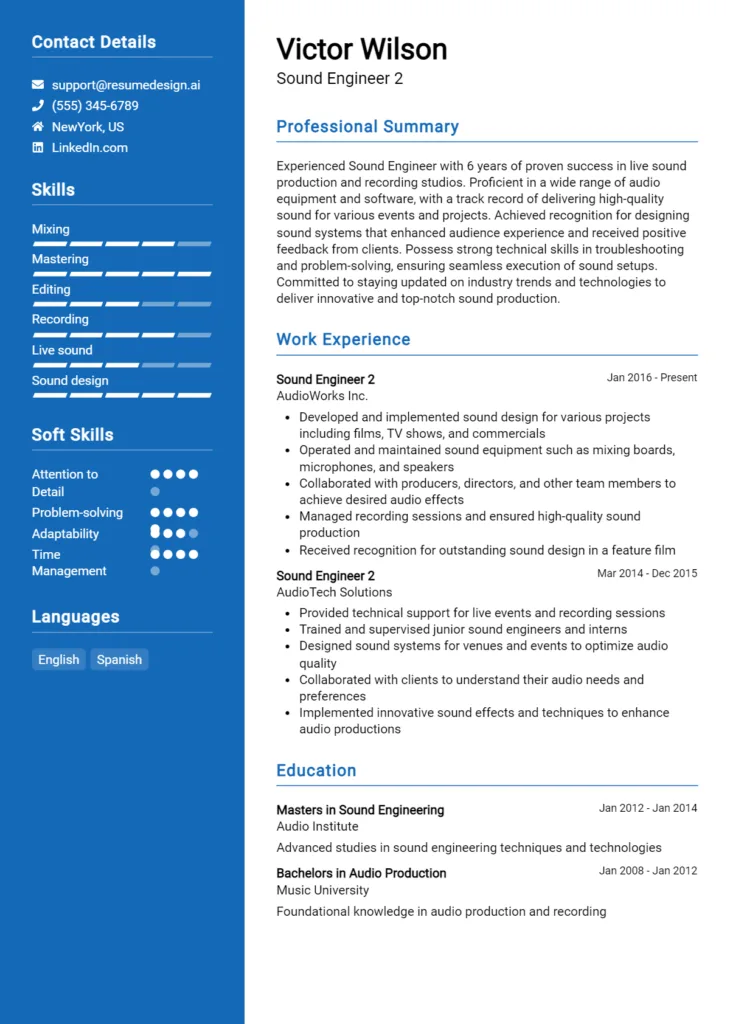Stage Manager Core Responsibilities
The Stage Manager plays a crucial role in coordinating various departments within a production, ensuring seamless collaboration between directors, actors, and technical staff. This position requires strong organizational, technical, and problem-solving skills to manage schedules, cue performances, and address any unforeseen challenges that arise. A Stage Manager's effectiveness directly contributes to the overall success of the production, making it essential to highlight these skills in a well-structured resume, showcasing operational expertise and the ability to maintain a cohesive workflow.
Common Responsibilities Listed on Stage Manager Resume
- Coordinate rehearsal schedules and manage daily operations.
- Facilitate communication between the cast and crew.
- Prepare and distribute prompt scripts with cues and notes.
- Oversee technical rehearsals and performances.
- Manage stage set-up and breakdown before and after performances.
- Ensure safety protocols are followed during rehearsals and shows.
- Assist in the creation of production budgets and resource allocation.
- Document changes and updates to scripts or production elements.
- Provide on-site support during performances to troubleshoot issues.
- Conduct post-show evaluations and provide feedback to the team.
High-Level Resume Tips for Stage Manager Professionals
In the competitive world of stage management, a well-crafted resume is crucial for making a strong first impression on potential employers. Your resume serves as your introduction, showcasing not only your skills and achievements but also your unique contributions to the productions you've managed. As stage management often requires a blend of creativity, organization, and leadership, it's essential that your resume reflects these attributes clearly and effectively. This guide will provide practical and actionable resume tips specifically tailored for Stage Manager professionals, helping you to stand out in the audition for your next big role.
Top Resume Tips for Stage Manager Professionals
- Tailor your resume to the specific job description, highlighting the skills and experiences that align with the requirements of the position.
- Showcase relevant experience prominently, including specific productions, venues, and the scope of your responsibilities.
- Quantify your achievements where possible, using numbers and statistics to demonstrate the impact of your work, such as the number of performances managed or budget sizes handled.
- Highlight industry-specific skills, such as knowledge of stagecraft, production software, and communication techniques that are vital for successful stage management.
- Use action verbs to convey your contributions dynamically, such as "coordinated," "developed," "oversaw," and "executed."
- Include any relevant certifications or training programs, such as first aid, safety training, or specialized workshops that enhance your qualifications.
- Keep your format clean and professional, ensuring that your resume is easy to read and visually appealing, with clear headings and consistent font styles.
- Incorporate a brief summary or objective statement at the beginning of your resume to provide a snapshot of your career goals and what you bring to the table.
- Proofread your resume multiple times to eliminate any spelling or grammatical errors, as attention to detail is crucial in the stage management profession.
By implementing these tailored tips, you can significantly enhance the effectiveness of your resume and increase your chances of landing a job in the Stage Manager field. A polished and targeted resume not only showcases your qualifications but also demonstrates your commitment to excellence in the performing arts industry, making you a standout candidate for potential employers.
Why Resume Headlines & Titles are Important for Stage Manager
In the competitive field of stage management, a well-crafted resume headline or title is crucial for making a strong first impression. This concise phrase serves as an introductory snapshot of a candidate’s qualifications, skills, and experience, instantly capturing the attention of hiring managers. A powerful headline succinctly conveys the essence of the applicant’s professional identity, making it easier for recruiters to identify top talent amidst a sea of resumes. It should be relevant to the specific stage management role being applied for, ensuring that it aligns with the job description and highlights the candidate’s unique strengths.
Best Practices for Crafting Resume Headlines for Stage Manager
- Keep it concise: Aim for a headline that is brief yet comprehensive, ideally no more than 10 words.
- Be role-specific: Tailor the headline to reflect the specific stage management position you are applying for.
- Highlight key skills: Include core competencies that align with the job requirements, such as organization, communication, or leadership.
- Showcase experience: If applicable, mention years of experience or notable productions you have worked on.
- Use action-oriented language: Strong verbs can create a sense of dynamism and professionalism.
- Avoid jargon: Ensure the language is clear and accessible to those outside your specific field.
- Make it impactful: Aim to leave a memorable impression that encourages hiring managers to read further.
- Update regularly: Revise your headline to keep it relevant to each job application or industry trends.
Example Resume Headlines for Stage Manager
Strong Resume Headlines
Dynamic Stage Manager with 5+ Years in Live Productions
Detail-Oriented Stage Manager Specializing in Large-Scale Events
Experienced Stage Manager Committed to Flawless Executions
Creative Stage Manager with Expertise in Collaborative Productions
Weak Resume Headlines
Stage Manager Looking for Opportunities
Experienced Professional in the Arts
Hardworking Individual with Management Skills
The strong resume headlines are effective because they are specific, highlight relevant experience, and convey a sense of professionalism that resonates with hiring managers. They provide a clear snapshot of what the candidate brings to the table, making it easier for recruiters to see the potential fit for their organization. In contrast, the weak headlines lack specificity and fail to convey any unique qualifications or strengths, which diminishes their impact and makes it difficult for hiring managers to see the candidate's value at a glance.
Writing an Exceptional Stage Manager Resume Summary
A resume summary is a vital component for a Stage Manager, as it serves as the first impression a hiring manager will have of a candidate's capabilities. A strong summary succinctly captures attention by highlighting key skills, relevant experience, and notable accomplishments that align with the demands of the role. It should be concise, impactful, and specifically tailored to the job description, ensuring that it effectively communicates the candidate's unique qualifications in just a few sentences.
Best Practices for Writing a Stage Manager Resume Summary
- Quantify achievements: Use numbers and statistics to demonstrate your impact, such as the number of productions managed or budget sizes handled.
- Focus on skills: Highlight key skills relevant to stage management, such as organization, communication, and problem-solving abilities.
- Tailor the summary: Customize your summary for each application to reflect the specific requirements outlined in the job description.
- Keep it concise: Aim for 2-4 sentences that deliver a powerful message without overwhelming the reader.
- Use action verbs: Start sentences with strong action verbs to convey confidence and dynamism.
- Highlight relevant experience: Emphasize your background in theater or event production, including specific roles and responsibilities.
- Showcase leadership: Illustrate your ability to lead a team, coordinate logistics, and manage multiple tasks effectively.
- Include industry-specific terminology: Use language and phrases that are familiar to professionals in the theater and performance industry.
Example Stage Manager Resume Summaries
Strong Resume Summaries
Dynamic Stage Manager with over 7 years of experience in overseeing live productions, successfully coordinating logistics for more than 50 performances, and managing budgets exceeding $500,000. Proven ability to lead teams and cultivate effective communication among cast and crew, resulting in a 20% increase in efficiency during production cycles.
Detail-oriented Stage Manager skilled in orchestrating complex stage setups and ensuring seamless transitions during performances. Recognized for implementing a new scheduling system that reduced rehearsal time by 30% while maintaining high production quality in a high-pressure environment.
Accomplished Stage Manager with a track record of managing multi-million dollar productions, adept at liaising between directors, actors, and technical teams. Successfully led a recent production that received critical acclaim, boosting ticket sales by 40% compared to the previous season.
Weak Resume Summaries
Stage Manager with experience in various productions. I am a hardworking individual who is dedicated to my job.
I have managed a few plays and I enjoy working with people in theater. Looking for new opportunities in stage management.
The examples of strong resume summaries are considered effective because they provide specific details, quantified achievements, and relevant skills that directly relate to the Stage Manager role. They convey a clear picture of the candidate's capabilities and contributions to past productions. In contrast, the weak summaries lack specificity and measurable outcomes, making them less compelling and failing to capture the interest of hiring managers.
Work Experience Section for Stage Manager Resume
The work experience section of a Stage Manager resume is critical as it serves as a platform to showcase the candidate’s technical skills, leadership abilities, and capacity to deliver high-quality productions. This section not only highlights the experiences that shape a stage manager’s career but also emphasizes their proficiency in managing teams, coordinating complex logistics, and maintaining a seamless production flow. By quantifying achievements and aligning experiences with industry standards, candidates can demonstrate their value and readiness to contribute effectively to future projects.
Best Practices for Stage Manager Work Experience
- Clearly outline technical skills relevant to stage management, such as lighting, sound, and set design.
- Use quantifiable metrics to demonstrate the impact of your work, such as the number of successful productions managed or budget savings achieved.
- Highlight collaborative efforts with directors, crew members, and cast to illustrate teamwork and leadership.
- Tailor your experiences to align with job descriptions and industry standards to enhance relevance.
- Incorporate specific examples of challenges faced and how they were overcome to showcase problem-solving abilities.
- Maintain a professional tone while conveying passion for the craft to engage potential employers.
- List experiences in reverse chronological order to prioritize the most recent and relevant roles.
- Include any certifications or specialized training that further support your competence in stage management.
Example Work Experiences for Stage Manager
Strong Experiences
- Successfully managed a 15-person crew for a large-scale musical, resulting in a 20% decrease in production time and a 30% increase in audience satisfaction ratings.
- Led the technical direction for a regional theater production that received three local awards, including Best Production and Best Stage Management.
- Implemented a new scheduling system that improved communication among the cast and crew, reducing conflicts and enhancing overall productivity by 25%.
- Coordinated with lighting and sound teams to design a dynamic audio-visual experience that contributed to a 40% increase in ticket sales compared to the previous year's performance.
Weak Experiences
- Helped with stage management duties on various shows.
- Worked with a team to set up equipment for performances.
- Gained experience in a theater production environment.
- Assisted with some tasks during rehearsals and performances.
The examples provided illustrate a clear distinction between strong and weak experiences. Strong experiences are characterized by specific achievements, quantifiable results, and clear evidence of leadership and collaboration. In contrast, weak experiences lack detail and fail to convey the candidate's impact or contributions within their roles, making it difficult for potential employers to assess their qualifications and capabilities.
Education and Certifications Section for Stage Manager Resume
The education and certifications section of a Stage Manager resume is crucial as it demonstrates the candidate's academic background, industry-relevant certifications, and commitment to continuous learning. This section serves as a platform to showcase specialized training and relevant coursework, which can significantly enhance the candidate's credibility and alignment with the job role. Employers often look for evidence of formal education and professional development that indicates a candidate is well-prepared to handle the complexities and demands of stage management.
Best Practices for Stage Manager Education and Certifications
- Focus on relevance: Include degrees and certifications that directly relate to stage management or the performing arts.
- Be detailed: Specify the name of the institution, degree or certification earned, and dates of attendance or completion.
- Highlight advanced credentials: Showcase any advanced degrees or specialized certifications that set you apart from other candidates.
- Include relevant coursework: Mention specific courses that are applicable to stage management, such as theater production, lighting design, or project management.
- Update regularly: Keep your education and certifications section current with any new qualifications or training you acquire.
- Use recognized institutions: Prioritize education from well-known and respected institutions in the performing arts field.
- Consider online courses: Include relevant online certifications from reputable platforms that demonstrate ongoing professional development.
- Showcase practical experience: If applicable, highlight any hands-on training or workshops that enhance your skill set as a stage manager.
Example Education and Certifications for Stage Manager
Strong Examples
- BFA in Stage Management, University of Drama, 2020
- Certified Production Manager (CPM), International Alliance of Theatrical Stage Employees, 2021
- Advanced Lighting Design Workshop, Stagecraft Institute, 2022
- Project Management for Creative Professionals, Coursera, 2023
Weak Examples
- High School Diploma, Springfield High School, 2015
- Certification in Basic First Aid, Red Cross, 2019
- Online Course in General Computer Skills, 2020
- Unrelated Degree in Business Administration, ABC University, 2018
The strong examples are considered effective because they directly relate to the field of stage management, showcasing relevant degrees, recognized certifications, and specialized training that enhance the candidate's qualifications. In contrast, the weak examples lack relevance to the stage management role, featuring outdated or unrelated qualifications that do not contribute to the candidate's credibility in the industry.
Top Skills & Keywords for Stage Manager Resume
As a Stage Manager, the ability to effectively coordinate and communicate is paramount. A well-crafted resume that highlights both hard and soft skills can significantly enhance your chances of landing the desired position in the competitive field of theatre and live events. Employers seek Stage Managers who not only possess technical expertise but also exhibit strong interpersonal abilities to manage diverse teams, solve problems, and ensure that productions run smoothly. Therefore, showcasing relevant skills is crucial in demonstrating your capability to excel in this dynamic role.
Top Hard & Soft Skills for Stage Manager
Soft Skills
- Excellent Communication
- Leadership Abilities
- Problem-Solving Skills
- Time Management
- Teamwork and Collaboration
- Adaptability
- Conflict Resolution
- Attention to Detail
- Creativity
- Stress Management
Hard Skills
- Knowledge of Stagecraft
- Proficiency in Lighting Design
- Sound Engineering Expertise
- Familiarity with Stage Management Software
- Understanding of Theatrical Terminology
- Budget Management
- Scheduling and Planning
- Technical Drawing Skills
- Experience with Production Planning
- Safety Protocol Knowledge
For more insights on the essential skills you should include in your resume and how to effectively present your work experience, consider these guidelines as you prepare your application.
Stand Out with a Winning Stage Manager Cover Letter
Dear [Hiring Manager's Name],
I am writing to express my enthusiastic interest in the Stage Manager position at [Company/Organization Name], as advertised on [where you found the job listing]. With over [number] years of experience in theatrical production and a strong commitment to fostering collaborative environments, I am confident in my ability to contribute to the success of your productions. My background in coordinating rehearsals, managing technical operations, and overseeing cast and crew dynamics has equipped me with a comprehensive skill set that aligns perfectly with the demands of this role.
Throughout my career, I have successfully managed various productions, including [specific productions or types of performances], where I honed my abilities in scheduling, communication, and problem-solving. My experience working closely with directors, designers, and technicians has taught me the importance of maintaining clear lines of communication and ensuring that everyone is aligned with the artistic vision. I thrive in fast-paced environments and take pride in my meticulous attention to detail, which allows me to anticipate potential challenges and address them proactively.
In addition to my technical skills, I bring a deep passion for storytelling and the arts. I believe that a successful production is built on teamwork, and I am dedicated to creating a positive atmosphere where creativity can flourish. My ability to adapt to changing circumstances and stay calm under pressure has been a significant asset during both rehearsals and live performances. I am excited about the opportunity to bring my unique perspective and skills to [Company/Organization Name], and I am eager to contribute to the creation of exceptional theatrical experiences.
Thank you for considering my application. I look forward to the possibility of discussing how my experience and vision align with the goals of your team. Please feel free to contact me at [your phone number] or [your email address] to arrange a meeting at your convenience.
Sincerely,
[Your Name]
[Your LinkedIn Profile or Website, if applicable]
[Your Address]
Common Mistakes to Avoid in a Stage Manager Resume
Crafting a compelling resume as a Stage Manager is crucial for landing opportunities in the competitive world of theater and live performance. However, many candidates often overlook key elements that can significantly impact their chances of securing an interview. By avoiding common mistakes, you can ensure that your resume effectively highlights your skills and experiences, presenting you as the ideal candidate for the job. Here are some of the most frequent pitfalls to steer clear of:
Overly Generic Objective Statement: Using a vague or generic objective statement can make your resume blend in with others. Tailor your objective to reflect your specific career goals and how they align with the position you’re applying for.
Neglecting Relevant Experience: Failing to emphasize relevant experience, such as specific productions or roles, can diminish your appeal. Make sure to highlight your contributions to each production and the skills you utilized.
Poor Formatting: A cluttered or unprofessional layout can distract from your qualifications. Use clear headings, consistent fonts, and ample white space to enhance readability.
Inaccurate Job Titles or Dates: Misrepresenting your job titles or employment dates can damage your credibility. Always be honest and accurate to maintain trust with potential employers.
Lack of Quantifiable Achievements: Simply listing responsibilities without quantifiable outcomes can dilute your impact. Include specific achievements, such as successfully managing a large cast or completing a production ahead of schedule.
Ignoring Soft Skills: Stage management is not just about technical skills; soft skills like communication, leadership, and problem-solving are equally important. Ensure these are highlighted in your resume.
Using Jargon or Technical Terms: While it’s important to showcase your expertise, excessive jargon can alienate hiring managers who may not understand it. Keep language accessible while still demonstrating your knowledge.
Forgetting to Proofread: Typos and grammatical errors can create a negative impression. Always proofread your resume or ask someone else to review it to ensure it is polished and professional.
Conclusion
As a Stage Manager, your role is crucial in ensuring the smooth execution of performances, from coordinating rehearsals to managing technical elements. Key qualities that make a successful Stage Manager include strong organizational skills, effective communication, and the ability to remain calm under pressure.
Throughout this article, we explored the essential responsibilities of a Stage Manager, including creating schedules, running rehearsals, liaising with directors and crew members, and troubleshooting any issues that may arise during performances. We also emphasized the importance of adaptability and problem-solving skills, as each production presents unique challenges.
To stand out in this competitive field, your resume should effectively highlight your skills, experiences, and achievements. Tailoring your resume to showcase relevant experience and using industry-specific language can significantly improve your chances of landing an interview.
Now is the perfect time to review your Stage Manager resume! Ensure it reflects your expertise and the qualities that make you a valuable asset to any production. Take advantage of the available resources such as resume templates, which can provide a professional layout, or utilize the resume builder for a customized approach. Don’t forget to check out resume examples for inspiration and cover letter templates to help you craft a compelling introduction to potential employers. Start refining your resume today to elevate your career in stage management!

